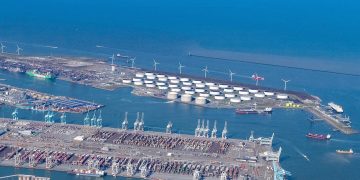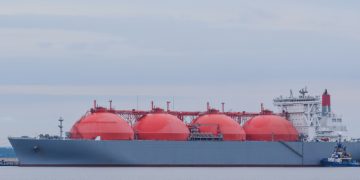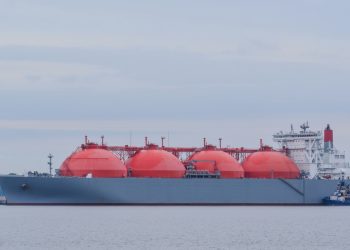During the 2025 GREEN4SEA Athens Forum, Bill Stamatopoulos, Global Marine Fuels Business Development Director, VeriFuel, discussed the evolution of the maritime industry, particularly in relation to B100 biofuel.
From kitchen waste to maritime innovation
The story of B100 FAME-based biofuel is, in many ways, an unexpected evolution, from something as ordinary as used cooking oil to a pivotal player in maritime decarbonization. Many of us remember the familiar scent of mothers’ and grandmothers’ cooking, a nostalgic memory now linked to a far more futuristic development. Only a few years ago, with less awareness of environmental issues and no clear economic benefit, used cooking oil was routinely discarded, often down kitchen drains.
Fast forward to today, and that same waste is a prized commodity. Specialized companies actively collect used cooking oil from restaurants and fast-food outlets for use as feedstock or for conversion into UCOME (Methyl Ester of Used Cooking Oil).
Remarkably, clean cooking oil may command a higher price when used for biofuel production than for its original culinary purpose.
The beginning of biofuel trials
The biofuel testing journey began in 2018 with the first trial conducted by Bureau Veritas Fuels on a CMA CGM vessel. Following this success, further testing was carried out from 2019 to today using increasingly complex blends. These included B10, B24, B30, and B50 fuels, but most notable is the use of B100 – pure biofuel, composed entirely of biogenic components.
From 2021 to 2024, more than 4 million metric tons of biofuel have been sold globally, with over 7,000 deliveries. Today, biofuel is available at around 60 bunkering locations, a remarkable milestone.
Different types of B100 biofuels
B100 can come in different forms: FAME-based, HVO-based (Hydrotreated Vegetable Oil), or newer emerging blends such as those developed in the Netherlands, which contain approximately 50–60% FAME with the remainder being biocomponents not regulated under EN 14214 or EN 15940 – the standards that currently cover FAME and HVO, respectively.
Physical and chemical properties of B100 FAME
In terms of its physical properties, B100 performs quite well. It has an average viscosity comparable to normal gas oil and a density significantly lower than marine gas oil. Its sulfur content is extremely low, almost negligible, while it maintains a high flash point and stable behavior.

Water content is minimal, and the cold flow properties depend heavily on the specific formulation. All these values are benchmarked using EN 14214, which is the established framework for analyzing FAME components and ensuring their fitness for marine application.
Pulling power: A fleet case study for FUEL EU
When we move from lab data to practical fleet scenarios, the results are even more compelling. One question posed was: how many identical vessels in a 20-ship Ultramax fleet could be brought into compliance by switching one vessel to B100?
Assuming all vessels have the same operational profile, replacing only residual fuel with B25 allows five additional ships to be covered. B50 allows for 12, and B100 has the potential to cover up to 28 vessels – exceeding the original fleet size itself.
Cost comparison across fuel scenarios
The cost implications of switching to biofuel are also promising. In a scenario modeled from 2026 to 2029, the “do nothing” approach using only fossil fuels comes with a total cost of around $32 million for the entire Ultramax fleet. B25 reduces that to $31 million, B50 to $30.7 million, and B100 lowers costs to $29 million, generating a surplus worth $1.3 million.
These figures include the differing costs of each fuel type, along with the expected compliance savings.
Technical and operational challenges
Naturally, there are some challenges. Availability remains a concern, and long-term storage can be tricky as some biofuels are more sensitive to aging. Microbial growth is another challenge that has to be taken seriously, ensuring the distillate fuel remains dry is important.
There is also the matter of corrosion potential with high-B blends like B80 and above, requiring operators to confirm the durability of their vessel’s components. Moreover, B100 biofuels have a lower energy content, which could be translated to a 6–7% increase in consumption.
Cold weather performance can be an issue as well, requiring heating systems in colder trading areas. That said, fuel recipes can be adjusted to improve cold flow behavior.
Advantages in engine performance
On the positive side, contamination risks are minimal. B100 generates no sludge and is stable.
When used consistently, there is no need for changeover procedures and the use of separators is optional. Engine performance is cleaner, and the simplified cylinder oil management adds another operational benefit.
Regulatory benefits of using B100
Regulatory advantages are also significant. Under the FuelEU Maritime Regulation, the benefits of B100 are immediate and clear. The EU ETS treats the biofuel fraction as zero, and for CII ratings, the carbon factor drops dramatically, from a traditional 3.11 to just 0.3 for B100. This is a game-changer in regulatory compliance.
B100 as the new normal
Reflecting on the progress since 2018, it is remarkable how quickly the perception of B100 has shifted from a niche idea to a viable industry standard. Nevertheless, success requires preparation.
Each operator must perform a full risk assessment, develop a fuel utilization plan, verify technical compatibility, and adapt strategies to the specific trading pattern of each ship. The ISO 8217:2024 standard is essential here, being the only one that clearly regulates biofuels with proper test specifications to prevent the inclusion of unregulated components.
In conclusion, the adoption of B100 FAME-based biofuels represents a powerful shift in the maritime industry’s approach to fuel. It offers measurable environmental and financial benefits, solid operational stability, and strong compliance advantages, when implemented correctly.
The views presented are only those of the authors and do not necessarily reflect those of SAFETY4SEA and are for information sharing and discussion purposes only.
The above article has been edited from Bill Stamatopoulos’ presentation during the 2025 GREEN4SEA Athens Forum.
Explore more by watching his video presentation here below



























































